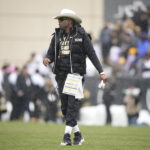LOS ANGELES — It took commissioner George Kliavkoff exactly six minutes and 45 seconds to acknowledge the woolly mammoth in the room Friday during his state-of-the-conference address at the Pac-12’s annual preseason media event.
When the time came, Kliavkoff did so with gloves off and zero punches pulled.
He said the conference was “very disappointed” that USC and UCLA are leaving for the Big Ten but outlined the Pac-12’s strategy moving forward and turned feisty during the question-and-answer session.
Kliavkoff didn’t name names but indicated the Pac-12 is actively exploring expansion.
He noted the conference’s next media rights deal is “highly likely” to involve a major digital media company.
“We are in the enviable position of being next to market after the Big Ten,” he said.
“We already have significant interest from potential partners, including both incumbents and new traditional television and most importantly, digital media partners. This interest is driven by the strength of our schools’ brands and markets and a recognition of our continued leadership position in college football across the western and Mountain time zones.”
Kliavkoff also said UCLA is in a “really difficult position” with regard to its jump to the Big Ten, apparently leaving open the possibility that the Bruins’ move might not happen.
“I think it is unlikely. But if they come back, we welcome them back.”
But Kliavkoff saved his sharpest arrows for the Big 12.
When asked about new commissioner Brett Yormark’s recent comments that the Big 12 is “open for business,” Kliavkoff responded:
“I appreciate that. We haven’t decided if we’re going shopping there yet or not.”
A minute later, he explained the zinger.
“That remark was a reflection of the fact I’ve been spending four weeks trying to defend against grenades that have been lobbed in from every corner of the Big 12 trying to destabilize our remaining conference.
“I understand why they’re doing it, when you look at the relative media value between the two conferences. I get it, I get why they’re scared, why they’re trying to destabilize it. I was just tired of that. That’s probably not the most collegial thing I’ve ever said.”
The tone of the remarks reflected what Kliavkoff feels is a diminished sense of collegiality among conferences as media dollars drive realignment decisions. Those decisions, in turn, thrust the weakened leagues into difficult positions and threaten resources for the athletes.
Referring to college sports writ large, he noted: “We have collectively lost sight of the student-athlete. We need to recalibrate our approach to ensure our filter for any decision is what is in their best interest.”
Other highlights from Kliavkoff’s address:
— The process of signing a new media rights agreement, so crucial to the long-term stability of the conference, could take “months,” Kliavkoff said.
The remark, coupled with his comment on the Pac-12 receiving interest from digital media companies, suggests the conference won’t sign with ESPN or Fox during their exclusive, 30-day negotiating window, which ends in early August.
— Asked if USC misled the conference about its commitment, Kliavkoff said: “I’m not going to talk about that. We’re going to take the high road and not talk about what happened in the past.”
— Stanford athletic director Bernard Muir, who joined Kliavkoff on stage, addressed speculation about the Cardinal being a target of the Big Ten.
“When this broke a month ago, we all, each one of us, we’re trying to figure out scenario planning,” Muir said. “We have discussions internally and try to figure that out. But we have had not had any formal overture from another conference.”
— Kliavkoff declined to state which schools could be targets for Pac-12 expansion but laid out a broad set of criteria, which include competitive success, media rights value and academic, geographic and institutional fit.
— Regarding USC and UCLA remaining in the conference for two years, he said:
“I personally have instructed everyone at our conference to make sure that USC and UCLA student-athletes are given every opportunity to compete and succeed for as long as they remain in the Pac-12.”
— He suggested additional economic reform is appropriate given the role athletes play in generating revenue for the schools:
“It’s time for us to consider steps we can take to fairly recognize our student-athletes’ contributions and more appropriately allocate the resources created through athletics without fundamentally changing the role of our educational institutions … One solution might be to consider whether to expand or remove the remaining caps on academic awards.”
— While noting that his message Friday was “one of optimism, both for the future of the Pac-12 and the state of our industry,” Kliavkoff is clearly discouraged by the fanatical quest for revenue that drives realignment.
He also called on the 10 Football Bowl Subdivision conferences to agree on legislation for name, image and likeness, which would eliminate the need for congressional oversight.
“The decisions we make in our future will determine whether we head toward a world in which a small handful of conferences are playing professional sports.”
Support the Hotline: Receive three months of unlimited access for just 99 cents. Yep, that’s 99 cents for 90 days, with the option to cancel anytime. Details are here, and thanks for your support.
*** Send suggestions, comments and tips (confidentiality guaranteed) to pac12hotline@bayareanewsgroup.com or call 408-920-5716
*** Follow me on Twitter: @WilnerHotline
*** Pac-12 Hotline is not endorsed or sponsored by the Pac-12 Conference, and the views expressed herein do not necessarily reflect the views of the Conference.
Related posts:
 Hotline Mailbag – How much longer for Edwards at ASU, Kliavkoff impact, more
Hotline Mailbag – How much longer for Edwards at ASU, Kliavkoff impact, more
 Pac-12 media rights: The home stretch arrives (or maybe not) as changes come to the power structure
Pac-12 media rights: The home stretch arrives (or maybe not) as changes come to the power structure

(AP Photo/David Zalubowski)
Pac-12 survival: All eyes on Colorado as university regents meet to discuss Big 12 move Mailbag: Kliavkoff’s status, a replacement option, ACC scenarios for Stanford and Cal, Big Ten TV, portal problems and more
Mailbag: Kliavkoff’s status, a replacement option, ACC scenarios for Stanford and Cal, Big Ten TV, portal problems and more

